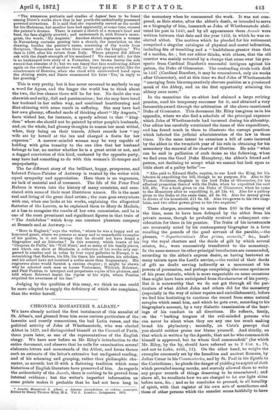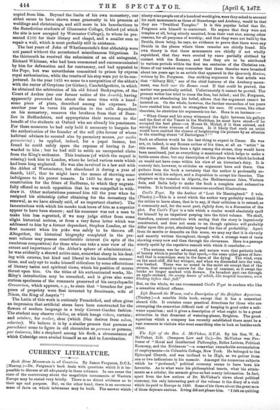CHRONICA MONASTERII S. ALBANI..
WE have already noticed the first instalment of this annalist of St. Alban's, and gleaned from him some carious particulars of the lawsuits and courtly connections, the bad Latin verses, and the political activity of John of Whethamstede, who was elected Abbot in 1120, and distinguished himself at the Council of Pavia, three years later, as one of the representatives of the English clergy. We have now before us Mr. Riley's introduction to the entire document, and observe that he culls for examination several elaborate letters and memoranda of the Abbot, and forms thence such an estimate of the latter's extensive but undigested reading, and of his scheming and grasping, rather than philosophic cha- racter, as accords but ill with a flattering tradition which some historians of English literature have preserved of him. As regards the authenticity of the Annals, there is nothing to he proved from internal evidence ; but the writer's imperfect information on some points makes it probable that he had not been long in
* Annates Monasterti S. Albani, a .Tohanne Amundesham, at videtur, canseriplf.
Edited by Remy Thomas Riley, MA. Vol. 2. London: Longman& 1871.
the monastery when he commenced the work. It was not com- posed, as Bale states, after the abbot's death, or intended to serve as a biography of him, inasmuch as John of Whethamstede abdi- cated his post in 1440, and by all appearances these Annals were written between that date and the year 1452, in which he was re- elected abbot. The motives which he pleaded for his retirement comprised a singular catalogue of physical and moral infirmities, including fits of trembling and a "bashfulness greater than that of a maiden, &c. ; but our editor thinks, with others, that the old courtier was mainly actuated by a change that came over his pro- spects from Cardinal Beaufort's successful intrigues against his patron, the Duke of Gloucester. The contending rivals both died in 1447 (Cardinal Beaufort, it may be remembered, only six weeks after Gloucester), and at this time we find John of Whethamstede "emerging from his comparatively obscure position as a pensioned monk of the Abbey, and on the first opportunity attaining the abbacy once more."
In the meantime the ex-abbot had claimed a large retiring pension, sued his temporary successor for it, and obtained a very favourable award through the arbitration of the above-mentioned Duke of Gloucester. This document Mr. Riley has given us in his appendix, where we also find a schedule of the principal expenses which John of Whethamstede had incurred during his abbotship.
Our editor has carefully scrutinized the items of this expenditure, and has found much in them to illustrate the corrupt practices which infected the judicial administration of the law in those times. To the same intent he examines a bill of costs incurred by the abbot in the twentieth year of his rule in obtaining for his monastery the renewal of its charter of liberties. He asks "what can be said in palliation of such items as the following, when we find even the Good puke Humphrey, the abbot's friend and patron, not declining to accept what we cannot but look upon as little short of a paltry bribe":—
" Also paid to Edward Hullo, esquire, to our Lord the Sing, for his labours in expediting the bill, though to no purpose, 40s. Also to Sir Thomas Northone, chaplain to the lord Duke of Gloucester, for his effectual promotion thereof with the Duke, when he expedited the said bill, 40s, For a book given to the Duke of Gloucester, when he came to the Monastery after so expediting it, £6 13s. 4d. Also for a palfrey given to the Duke at the same time, £3 6s. 8d. Also for money given to divers of his household, £11 6s. 8d. Also two gowns to his two chap- lains, and two other gowns given to his two esquires."
These charges, amounting to more than £80 in the money of the time, seem to have been defrayed by the abbot from his private means, though he probably received a subsequent con- sideration for them in his pension. The fruits of his investments are reverently noted by his contemporary biographer in a form recalling the pounds of the good servant of the parable,—the phrases, " S'aperlucrationis Mna prima, secunda," &c., head- ing the royal charters and the deeds of gift by which several estates, &c., were successively transferred to the monastery. In the same manner its other principal benefactors are commended, according to the abbot's express desire, as having bestowed so many talents upon the Lord's service,—the recital of their deeds of gift no doubt serving indirectly as a monument of his powers of persuasion, and perhaps comprising also some specimens of his prose rhetoric, which is more respectable on some occasions than might have been anticipated from the character of his poetry. But it is noteworthy that we do not get through all the par- ticulars of what Abbot John and others did for the monastery (especially in the way of minor repairs and embellishments), before we find him hesitating to continue the record from some natural scruples which assail him, and which he gets over, according to his biographer's account, by a very dialectic examination of the bear- ings of his conduct in all directions. He reflects, firstly, on the "barking tongues of the evil-minded persons who can never be silent when they see any one too much making broad his phylactery ; secondly, on Cato's precept that you should neither praise nor blame yourself. And thirdly, on that which is written by the Apostle, that not he who comrnendeth himself is approved, but he whom God commendeth" (for which Mr. Riley, by the by, should have referred us to 2 Cor. x., 18, and not to Luke, xviii., 14). On the other hand, he weighs the examples commonly set by the Israelites and ancient Romans, by Julius Cmsar in his Commentaries, and by St. Paul in his Epistle to the Corinthians ; he pleads the danger of yielding to a spirit of sloth which prevailed among monks, and scarcely allowed them to write any proper records of things deserving to be remembered ; and above all, he recollects how we are charged to let our light shine before men, &c. ; and so he concludes to proceed, in all humility of spirit, with that register of his own acts of munificence and those of other persons which the annalist seems faithfully to have
copied from him. Beyond the limits of his own monastery, our abbot seems to have shown some generosity in his presents at weddings and christenings, and still more in his benefactions to the Benedictine students of Gloucester College, Oxford (of which the site is now occupied by Worcester College), to whom he pre- sented £100 for their library and chapel, and a smaller sum to repair a wall, which is most probably still in existence.
The last years of John of Whethamstede's first abbotship were not passed without the accustomed miscellaneous litigations. In the thirteenth he received the submission of an old antagonist, Richard Whitman, who had been summoned and excommunicated by him for defamation and for contumacy, and had appealed to the Pope, but was nevertheless committed to prison by express royal authorization, while the results of his step were yet to be con- jectured. In the year 1435 we come to a composition of the abbot's with the rector of Greytone (or Girton), Cambridgeshire, in which he obtained the arbitration of his old friend Beckyngton, of the Court of Arches (see our former notice of the Annals), having apparently presented him about the same time with a hand- some piece of plate, described among his expenses. In another year he turns his attention to the cells dependent on his monastery, removes the brethren from that of Beau- lieu in Bedfordshire, and appropriates their revenues to the benefit of the students at Oxford who are already his pensioners. For these measures he had only held it necessary to bargain for the authorization of the founder of the cell (the favour of whose habitual advisers he secured also by pecuniary means, per media pecuniaria) ; he applied, indeed, for a papal licence, but found he could safely spare the expense of having it for- warded to him ; but he had still to settle an unexpected claim from the King's escheator. This business (of which the sequel is missing) took him to London, where he levied various rents which had been long neglected. Ile was also involved in a law suit with the Abbot of Westminster, but abandoned it during a year of dearth, 1437, that he might have the means of showing some indulgence to his poorer tenants. In 1439 he drew up a new constitution for the friars of Redburne, to which they ungrate- fully offered so much opposition that he was compelled to with- draw it. Other molestations pursued him till the year when he resigned his abbotship (after obtaining for the monastery the renewal, as we have already said, of an important charter). The lamentations with which his monks took leave of him as a superior appear to have been sincere; and his successor was not a man to make him leas regretted, if we may judge either from some slight historical notices, or from a very fierce letter which was addressed to him by a former dependent, Stephen London, at the first moment when his yoke was safely to be thrown off. Altogether, the historical biography completed in the pre- sent volume may possess considerable interest (in spite of the cumbrous composition) for those who can take a near view of the extent and importance of the Abbot's sphere of administration ; he was evidently a shrewd active man, somewhat sharp in his deal- ing with externs, but kind and liberal to his immediate connec- tions, and only apt to make himself ridiculous by some affectations of literary tastes and spiritual views, which his position of course thrust upon him. On the titles of his authenticated works, Mr. Riley's introduction may be consulted, and it gives also some curious specimens of the remnants preserved of his encyclopmdic Granarium, which appears, e. g., to state that "breeches for pur- poses of propriety were first invented by Semiramis, wife of Ninus, the King of Assyria " I The Latin of this work is curiously Frenchilied, and often gives an impression that artificial stems have been constructed for the flowers of modern language in a truly Covent-Garden fashion. The student may observe ridellus, on which hangs rideau, curtain ; and sotulare, for soulier, shoe (which Diez derives from solum, solarizes). We believe it is by a similar process that parsons or parochiani come to figure in old chronicles as persona or persons, par eminence, like a shepherd among his flock, a circumstance of which Coleridge once availed himself as an Aid to Lucubration.



































 Previous page
Previous page